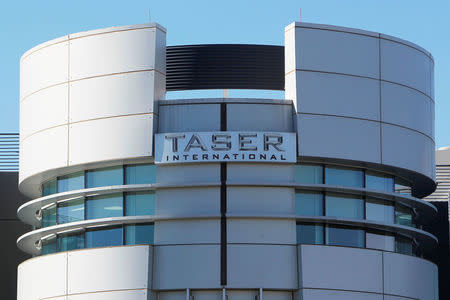Taser’s defense tactics include lawsuits against coroners and experts

By Tim Reid and Paula Seligson WASHINGTON (Reuters) - When an Indiana medical examiner ruled a Taser contributed to a jailhouse death, the company struck back – suing the examiner. When an electrical engineer concluded Taser shocks were more dangerous than Taser International Inc contended, the publicly traded company filed suit. And when an Ohio medical examiner attributed deaths partly to its stun guns, she, too, found herself in court. Those cases represent the flip side of Taser’s strategy of forging deep ties with coroners and other professionals. Not only does the Arizona stun gun manufacturer court allies. It sometimes sues critics. Such cases have an impact on medical examiners, according to a 2011 survey of 222 medical examiners nationwide. Its conclusions: 14 percent said they modified diagnostic findings due to the possible threat of litigation from Taser, and 32 percent said that threat could affect future decisions. Taser’s lawsuits had “a chilling effect,” said William Oliver, an assistant medical examiner in Knox County, Tennessee, and author of the survey, published in The American Journal of Forensic Medicine and Pathology. The lawsuits, he said, could be viewed as “an attack on scientific expression.” In a 2007 deposition, Taser CEO Rick Smith said suppressing science is not the company’s intent. “Taser does not use any of these tactics to intimidate,” Smith said. “We're challenging the findings. We think they're wrong. We think leaving those wrong standings … risks implications in litigation against us as Taser International, litigation against the police department.” In 2006, Taser sued Lisa Kohler, an Ohio medical examiner, arguing that she erred in implicating the company’s weapons in three deaths. The company asked the court to change the cause of death rulings and remove any references to Tasers. A judge ruled in the company’s favor, ordering that Kohler remove Taser's name from three autopsies that attributed deaths at least partly to the stun guns. Kohler declined to comment. Also in 2006, Taser sued electrical engineer James Ruggieri, who wrote a peer-reviewed study that said Taser shocks were more dangerous than the company stated. In its lawsuit, Taser said Ruggieri was mounting an “anti-Taser campaign,” was unqualified to do so, and made money from delivering anti-Taser presentations and appearing as an expert witness. Ruggieri counter-sued, leading to a settlement. In court documents, Taser said Ruggieri “effectively withdrew his attempts to be recognized as an expert against Taser.” In 2005, Taser sued Roland Kohr, an Indiana medical examiner who testified a Taser contributed to the 2003 death of James Borden, 47, who died after he was stunned three times while in jail. Taser sued Kohr for, among other claims, defamation and product disparagement. Borden suffered from heart disease and had ingested toxic levels of two drugs. Kohr said he died of cardiac dysrhythmia, or disorder of the heartbeat. He listed an enlarged heart, pharmacological drug intoxication and electric shock as contributing factors. Kohr counter-sued, citing an Indiana law designed to prevent legal bullying. The case settled in October 2009. Under the settlement terms, reviewed by Reuters and not previously reported, Kohr could not comment on Borden’s death or make negative remarks about Tasers. “Dr. Kohr shall cease and desist from any negative comments, statements, publications, articles, manuscripts, interviews, or oral or written utterances of any type regarding TASER, its products, services, or personnel,” the settlement said. If asked to review another Taser case, Kohr must notify the company in advance before offering official opinions involving cause of death, it said. When the case settled, Taser issued a statement defending its stun gun. "We feel vindicated by this dismissal, and remain committed to our ongoing strategy of aggressively defending this type of litigation,” the company said. (Editing by Ronnie Greene and Michael Williams)
